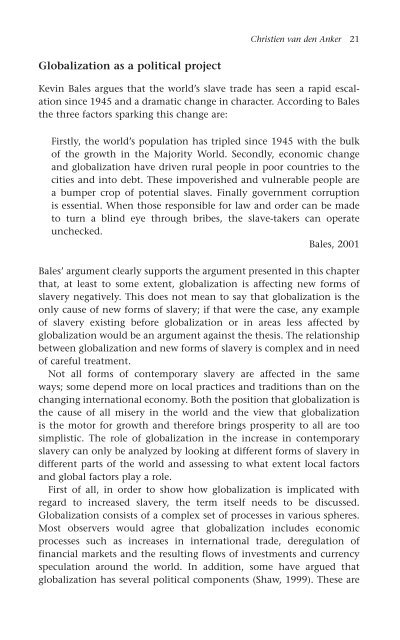3071-The political economy of new slavery
3071-The political economy of new slavery
3071-The political economy of new slavery
You also want an ePaper? Increase the reach of your titles
YUMPU automatically turns print PDFs into web optimized ePapers that Google loves.
Christien van den Anker 21<br />
Globalization as a <strong>political</strong> project<br />
Kevin Bales argues that the world’s slave trade has seen a rapid escalation<br />
since 1945 and a dramatic change in character. According to Bales<br />
the three factors sparking this change are:<br />
Firstly, the world’s population has tripled since 1945 with the bulk<br />
<strong>of</strong> the growth in the Majority World. Secondly, economic change<br />
and globalization have driven rural people in poor countries to the<br />
cities and into debt. <strong>The</strong>se impoverished and vulnerable people are<br />
a bumper crop <strong>of</strong> potential slaves. Finally government corruption<br />
is essential. When those responsible for law and order can be made<br />
to turn a blind eye through bribes, the slave-takers can operate<br />
unchecked.<br />
Bales, 2001<br />
Bales’ argument clearly supports the argument presented in this chapter<br />
that, at least to some extent, globalization is affecting <strong>new</strong> forms <strong>of</strong><br />
<strong>slavery</strong> negatively. This does not mean to say that globalization is the<br />
only cause <strong>of</strong> <strong>new</strong> forms <strong>of</strong> <strong>slavery</strong>; if that were the case, any example<br />
<strong>of</strong> <strong>slavery</strong> existing before globalization or in areas less affected by<br />
globalization would be an argument against the thesis. <strong>The</strong> relationship<br />
between globalization and <strong>new</strong> forms <strong>of</strong> <strong>slavery</strong> is complex and in need<br />
<strong>of</strong> careful treatment.<br />
Not all forms <strong>of</strong> contemporary <strong>slavery</strong> are affected in the same<br />
ways; some depend more on local practices and traditions than on the<br />
changing international <strong>economy</strong>. Both the position that globalization is<br />
the cause <strong>of</strong> all misery in the world and the view that globalization<br />
is the motor for growth and therefore brings prosperity to all are too<br />
simplistic. <strong>The</strong> role <strong>of</strong> globalization in the increase in contemporary<br />
<strong>slavery</strong> can only be analyzed by looking at different forms <strong>of</strong> <strong>slavery</strong> in<br />
different parts <strong>of</strong> the world and assessing to what extent local factors<br />
and global factors play a role.<br />
First <strong>of</strong> all, in order to show how globalization is implicated with<br />
regard to increased <strong>slavery</strong>, the term itself needs to be discussed.<br />
Globalization consists <strong>of</strong> a complex set <strong>of</strong> processes in various spheres.<br />
Most observers would agree that globalization includes economic<br />
processes such as increases in international trade, deregulation <strong>of</strong><br />
financial markets and the resulting flows <strong>of</strong> investments and currency<br />
speculation around the world. In addition, some have argued that<br />
globalization has several <strong>political</strong> components (Shaw, 1999). <strong>The</strong>se are


